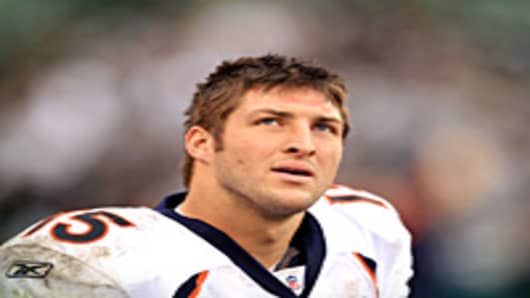It was believed Tim Tebow, quarterback legend from the University of Florida, where Gatorade was invented 45 years ago, would sign with the PepsiCo sports drink brand.
But the natural connection isn’t the drink that the now Denver Broncos quarterback, who will start for the second straight week this Sunday, will endorse.
Instead, Tebow’s drink of choice will be FRS Healthy Energy, the only drink on the market that uses Quercetin as its main ingredient. Quercetin is a naturally occurring antioxidant that was originally used to give energy to cancer patients.
“I use their products regularly and can honestly say that I believe FRS has helped me perform at my best on and off the field,” Tebow said, in a statement. “I look forward to sharing my FRS story with fans and spreading the word on this amazing brand.”
“People expected him to sign with Nike,” said Angel Gonzalez, who along with Tebow’s brother Robby handles the quarterback’s marketing deals for XV Enterprises. “His Jockey deal was a little bit different, but this deal will change the playing field.”
Gonzalez said that Pepsi’s Gatorade and Coca-Cola’s Powerade were also involved in the bidding.
Despite starting for the first time this past week, Tebow is still plenty marketable. He has led the league in jersey sales since the beginning of the season.
For FRS, the Tebow signing is another move towards gaining mainstream acceptance. The brand got on the map three years ago by signing Lance Armstrong, who endorses the product and owns a piece of the company. In April, they got a vote of confidence from Oak Investment Partners, who led a $23.1 million round of financing. And the big news came in June, when they signed a deal with PepsiCo to serve as their distributor.
Since PepsiCo also owns Gatorade, Tebow’s passing up of the nation’s leading sports drink brand might be a little bit awkward.
“We don’t view ourselves as their competitor,” said Carl Sweat, president and CEO of The FRS Company. “We partnered with them because we know that they know how to sell science better than anyone.”
FRS didn’t win Tebow’s endorsement by paying him the most money. Terms of the deal weren’t disclosed but Gonzalez said that the multi-year deal did include some equity in the company. FRS became intrigued with Tebow when they heard he walked into a Gainesville GNC while training for the NFL combine to purchase the product.
Gonzalez said Tebow drank FRS drinks during the combine, where the 2007 Heisman Trophy winner set a host of quarterback records including the broad jump and the vertical leap.
“We definitely went against the grain by going with FRS, but this is a real authentic endorsement of a product that he believes in,” Gonzalez said.
The product is less seen as an energy drink and more of a wellness drink. On its cans, the company says the drink has become “the choice for people looking to increase their energy and stamina…without crashing.”
"FRS has gotten the word out about its product in recent years by employing stealth marketing tactics that allow the company to advertise its free trials on tons of web sites on the cheap. The company has scored millions of impressions of its ads of Armstrong and Derek Fisher, the Los Angeles Lakers guard who also endorses the brand."
FRS has gotten the word out about its product in recent years by employing stealth marketing tactics that allow the company to advertise its free trials on tons of web sites on the cheap. The company has scored millions of impressions of its ads of Armstrong and Derek Fisher, the Los Angeles Lakers guard who also endorses the brand.
Sweat says the company will use Tebow on the Internet, but also plans a big buy.
“We’ll use him in the less expensive market focusing on the intellectual search advertising, but with the Pepsi deal, we also must create big buzz every once in a while,” Sweat said.
Sweat said he planned to use Tebow in a Super Bowl spot, but the NFL denied it, saying it has a rule against advertising supplements on the broadcast. Instead, Sweat said the company will have a television ad on BCS broadcasts in the top 15 markets.
As part of the deal, 25 percent of the proceeds from FRS product sales over the next 10 days will be donated to the Tim Tebow Foundation.
There haven’t been a ton of studies done on Quercetin, but the American Cancer Society says it could have a role in potentially preventing cancer. Its energy attributes have reportedly led to the military experimenting with putting Quercetin in the energy bars given to soldiers. FRS notes on the can that the product is not intended to “diagnose, treat, cure or prevent any disease.”
FRS is currently the only drink on the market that uses Quercetin. Although it’s present in blueberries and apples, Sweat says FRS has locked up top distributors of the flavonoid and says competition would have to figure out how to make its pure form digestible in a drink, which Sweat says is a huge challenge.
Sweat says he’s confident that Quercetin is a value-added for athletes and that the company is always following the latest studies on the dietary supplement.
More than 50 percent of FRS sales are its ready-to-drink product, whose flavor profile was recently changed. The company also sells energy chews and concentrate, which is mixed with water. As the company is private, Sweat would not say how well the business is doing other than to say overall sales doubled last year and the company is on track to do 70 percent better this year.
Questions? Comments? SportsBiz@cnbc.com



